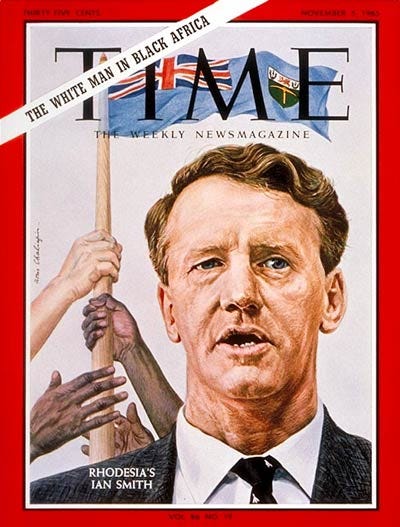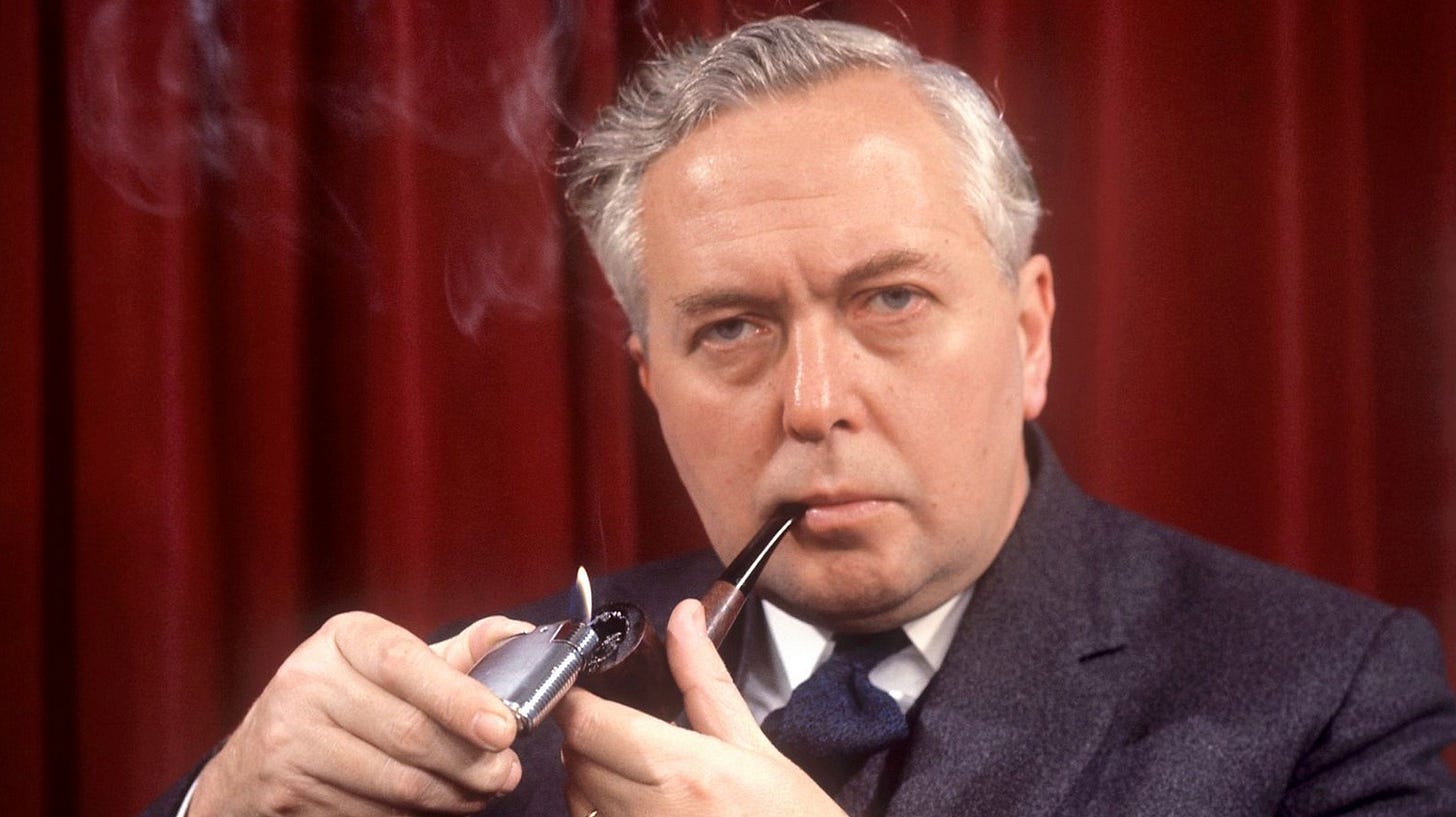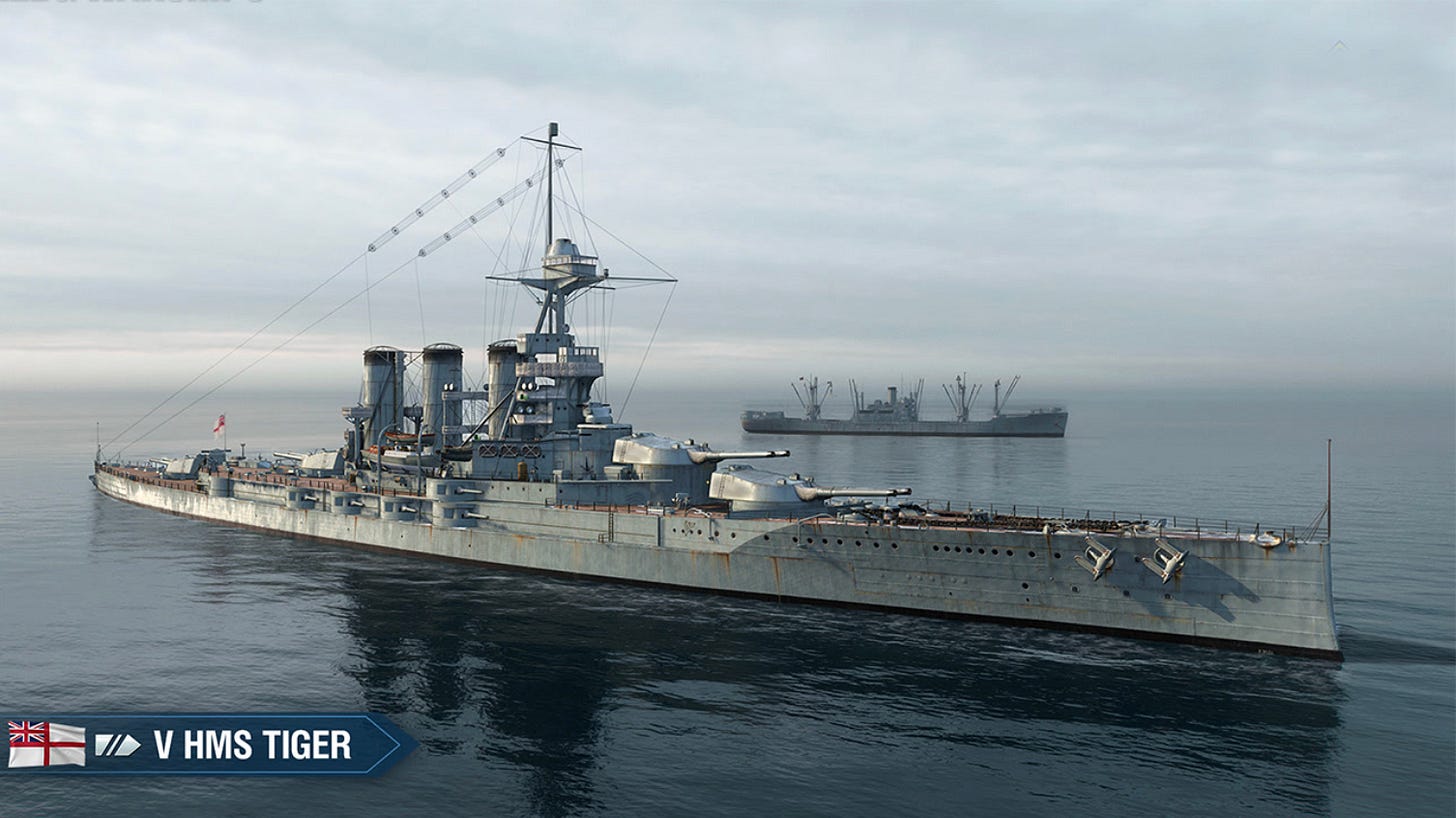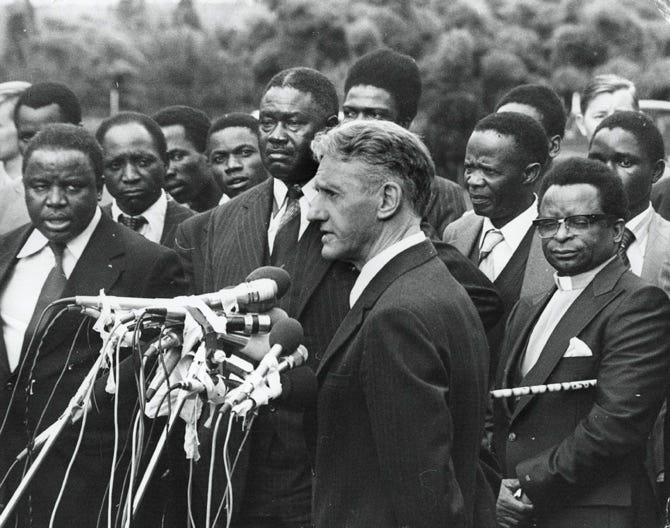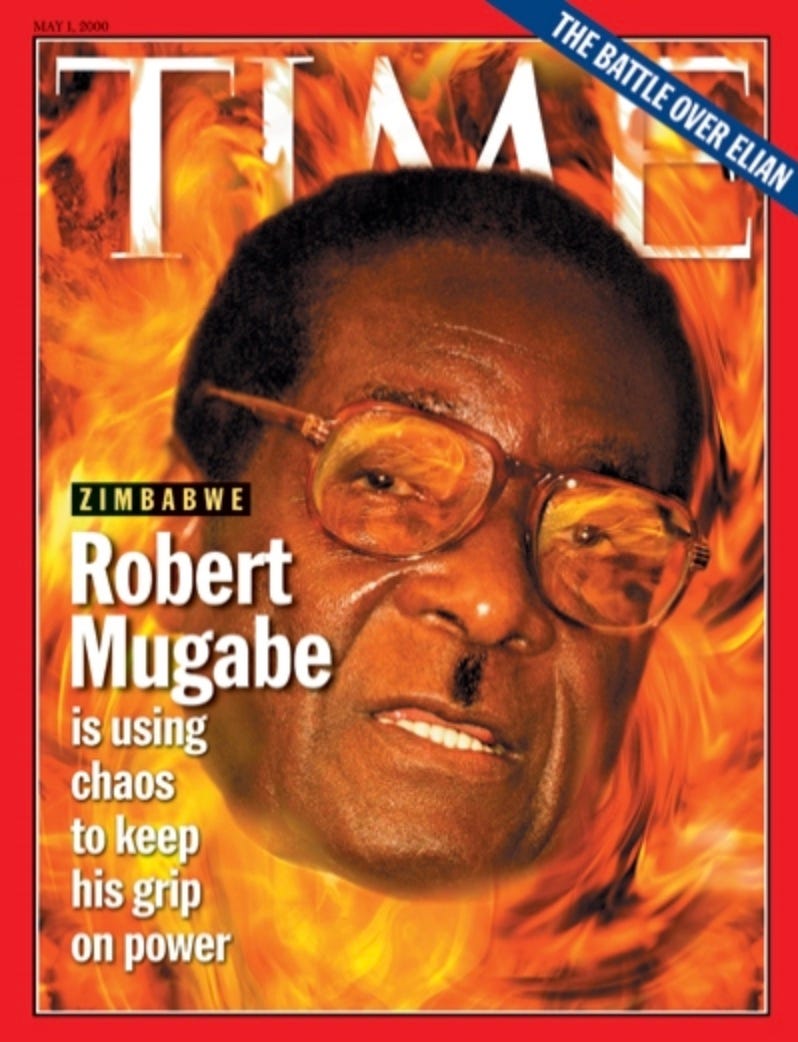Ian Smith’s The Great Betrayal cost me 200 bucks on Amazon. Why? Because it is a true account of the fall of Rhodesia and that truth is damning. Not only to the reputations of the morons who allowed it to happen, but also to the entire liberal world view. And so the book is out of print and costs a fortune.
The key takeaway is that the “official history” of Rhodesia is garbage. It goes something like this:
“Racist white Rhodesians were oppressing the majority black population, but thanks to black nationalist freedom fighters, wise liberal politicians and the United Nations Rhodesia was set free.”
That version of history is a steaming pile of horseshit.
And if there was one man in the world in a position to know that, it was the author of this book, the former Prime Minister of Rhodesia: Ian Smith. The official version of history will record Smith as a villain, but he was anything but.
Ian Smith was a total badass.
When war broke out in 1939, he dropped out of college to enlist, became a fighter pilot, was shot down over occupied Italy, escaped capture and machine gun fire, lived in a cave for three months, hiked up the alps at night, hiked down the alps in bare-feet, and then faked his way across a Nazi checkpoint back to freedom. Although this diversion qualified Smith for furlough back home, but he insisted on a return to active duty, and finished the war flying Spitfires over Germany.
Although he was not British, Smith had fought valiantly on behalf of Britain. Little did he know Britain would turn into his greatest enemy. And he was elected Rhodesian Prime Minister in 1964 specifically to fight them.
Like many other African nations at the time, Rhodesia wanted its independence from Britain, but Britain would only grant it if Rhodesia implemented majority rule. Full voting rights for everyone, black or white, rich or poor.
Rhodesia didn’t want to do it.
Rhodesia had been running itself with a unique “merit based” qualification for voting rights. A citizen needed to be able to read, and either to earn a certain amount of income, or own a certain amount of property. Although these criteria favored the 250,000 whites over the 7 million blacks, it wasn’t actually a problem.
Rhodesian blacks had the highest standards of living in Africa. Blacks from neighboring countries move TO Rhodesia because it was better than their own lands. There was no “oppression” in Rhodesia. There was no problem in Rhodesia, it was peaceful and prosperous, the jewel of Africa, and the Rhodesians wanted to keep it that way.
They had seen what happened to neighboring countries that had been given majority rule: civil war, tribal genocides, communist terrorism, dictatorships, and starvation.
No thanks.
And the vast majority of native black Rhodesians did not even consider themselves “Rhodesian.” That was the white man’s tribe. They considered themselves Matabele, or Shona, or any number of other indigenous tribes, and they preferred the tribal system of governance they had lived under since time immemorial.
And the white Rhodesians LET THEM.
Ian Smith described their tribal system in glowing terms:
“I know of no method which gives more honest and genuine representation stemming from the grassroots and ensuring that the peoples feelings are accurately submitted and explained. The system is devoid of corruption, nepotism, intimidation, propaganda and brainwashing.”
Yet Britain and other “free-world” countries continued to insist that the Rhodesian native people abandon their favored tribal system for a Western-style democracy. Something they did not understand and did not want.
So it was NOT the white Rhodesians who were trying to oppress the black natives, but rather meddling liberals from faraway trying to impose their values on peoples they did not know.
And no one was more of a meddler than the British Labour Party’s Harold Wilson.
When Wilson became Prime Minister he did everything he could to prevent Rhodesia from going their own way. Wilson spent a lot of time preaching about high liberal values like “equality” and “democracy” and fighting “racism” to win the public’s favor. It was all going his way until Ian Smith was interviewed by the BBC, then public opinion swayed far in favor of Rhodesia.
Smith told the story of a black worker on his farm that he tried to convince to allow his son to attend school. He explained to the man the advantages an education would provide to his son. But the man didn’t want it. He wanted his son at home performing traditional duties to his family and tribe.
What was Smith to do?
Force the man’s son into school at gunpoint? To impose his Western values on the natives? To become an actual oppressor? And as far as conducting a modern democracy, how realistic was it for a majority who could not read, did not want to read, who lived by hunting small animals and picking berries to manage a modern economy? A modern sewage system? A modern military?
Another Rhodesian policy that came under scrutiny was its Land Apportionment Act, which Western liberals called “Apartheid.” But Smith pointed out that the act did not prevent blacks from living in white areas, it prevented whites from purchasing tribal lands and evicting the natives. The liberal insistence on revoking the act would not help the natives, it would hurt them.
Additionally Smith pointed out, the supposed “black nationalist” groups who were pushing for majority rule in Rhodesia were in fact communist revolutionaries that wanted to intimidate and terrorize themselves into power. They were simply manipulating the false sympathies of the liberal west into supporting them.
To these explanations Harold Wilson was only silent. And he tried to silence Smith on the world stage, as well as prevent him from visiting Britain again. But Smith had powerful admirers who would help him even from the grave. When Churchill died, he stipulated in his will that Ian Smith be invited to the ceremony.
And so Smith traveled to London again, where Queen Elizabeth would also hold a luncheon for all the Commonwealth PMs. Now Smith would not only be able to make his case to the entire Commonwealth, but to the Queen as well. But somehow Smith's invitation to the Queen's lunch was “misplaced."
So Smith didn't go.
But the Queen noticed his absence, sent for him, and then both she and Prince Philip visibly encouraged Smith for all to see. Harold Wilson was reportedly infuriated but there was nothing he could do, other than make up a story that Smith had only pretended not to have been invited to stir up drama, while continuing to demonize Rhodesia in the press.
But if Wilson and the world wanted "majority rule" for Rhodesia, then Smith would give it to them. He got the unanimous endorsement from the tribal chiefs who represented 90% of the black population, he won a referendum on independence in which anyone of any color were allowed to vote, and he held a national election which his party won by 2/3rds majority.
And if that wasn’t enough, he even proposed that the Rhodesian Senate be made up entirely of the Tribal Chiefs and given absolute veto power. Surely that would satisfy both world opinion and Harold Wilson that Rhodesia was not trying to oppress anyone, that Rhodesia was worthy of its independence?
Nope. Still not good enough.
So Rhodesia stopped asking. Rhodesia declared Independence in 1965.
Neighboring countries like Uganda wanted Britain to declare war and invade. But British public opinion was still with Rhodesia. So in order to negotiate without allowing Smith back on the BBC, Wilson set negotiations to be held aboard a British Cruiser in the middle of the Mediterranean Sea.
Perhaps Wilson also meant to impress upon Smith Britain’s military might, but the negotiations went nowhere, and Smith was reassured by one of the ship’s officers that the military option was going nowhere. He said, “There are 674 crew on this ship. 672 are on your side. And the other two buggers went overboard long ago!”
Lacking any other options, Britain imposed sanctions on Rhodesia, and most of the world followed. Only three countries sided with Rhodesia: South Africa, Portugal (along with their African colony Mozambique), and Israel.
Despite the blockade, Rhodesia continued to prosper and would have remained peaceful, except that the international condemnation had emboldened the communist revolutionaries to begin terrorizing rural populations. It was the beginnings of the “The Bush Wars” which would only escalate with time.
But still, the vast majority of Rhodesians, black and white, were happy with the way things were. Best expressed by Chief Sigola of the Matabele tribe when he wrote to the UN:
“Rhodesia is a peaceful country, there is no war here. The talk of the overseas people is the only thing that could cause a war here. Our only trouble is from terrorists who come with bombs from Russia and China, communist countries with no freedom of speech, or opposition parties. We played with you to come and visit us in our country to see for yourself what a peaceful country it is. Why should the UN which is made to keep the peace come and interfere with us in our country, where we are already so peaceful? In our language we say you cannot have two bulls in one paddock. We have our bull in this country, which is our government. We do not wish to be ruled or interfered with by anyone else.”
So what did the UN do?
They passed a resolution declaring that Rhodesia was a "threat to world peace."
Even when the commies shot down civilian passenger jets and killed the survivors on the ground, somehow it was still Rhodesia’s fault.
Of course Rhodesia was no threat to "world peace." They were however a threat to liberal delusions, communist warlords, and the egos of foreign politicians. Rhodesia just wanted to be left alone. But the communist insurgents would not leave Rhodesia alone, they were launching larger and larger incursions with support and training from Russia, China, and Cuba.
If they thought they were going to have an easy time over-running tiny Rhodesia, boy were they in for a surprise. In addition to a small competent army, the Rhodesian SAS proved to be a highly effective killing machine, with casualty ratios exceeding 10-1.
And if the communists tried to hide, Rhodesia’s Selous Scouts would hunt them down, even across foreign borders, infiltrate their camps, and either call in air-support or kill them from within. Rhodesia might have been small, but it was a nation of Rambos.
They never lost a battle.
And all of this was happening at the height of the Cold War. When the “free-world” was supposedly fighting communism, yet Rhodesia got no support at all when they were actively fighting actual communists. What an embarrassment. Not even the anti-communist Nixon, nor British conservatives when they returned to power would lend assistance.
It’s a good example of how communists weaponize the word “racism.” For if Western leaders were not so deathly afraid of being called “racist” they might have acted differently. And so by demonizing Smith and Rhodesia as “racist” the communists ensured that they would go unsupported.
Although Rhodesia fought valiantly, it was clear they could not do so forever. The Bush Wars had already been going on more than a decade when the Angel of Death showed up to save the day, sometimes known by his other name: Henry Kissinger.
Kissinger said he wanted to normalize relations, prevent the spread of communism, and ensure Rhodesia maintain a healthy economy as it transitioned to majority rule. But over the coming years a series of betrayals turned Kissinger's promise upside down.
One of those promises was to keep Robert Mugabe from taking power, but that promise like all the others was betrayed.
Ian Smith stayed on as opposition, but once the country passed into majority rule its fate was set. From prosperous white-ruled Rhodesia, to basket-case black-ruled Zimbabwe.
Despite the needless human suffering and the destruction of a once peaceful and prosperous nation, the fall of Rhodesia is considered a “success” in liberal la-la-land. A triumph of grand ideals like democracy, equality, and anti-colonialism. The suffering of real people in the real world is nothing to the lib-tard, who prefers to live in a bubble of buzz words.
But the failure of Rhodesia calls into question many liberal presumptions.
Perhaps “democracy” is not a guaranteed path to prosperity and freedom?
Perhaps “colonialism” wasn’t all that bad?
Perhaps “equality” is a myth?
Perhaps ethnic and cultural differences make some groups more capable of governing a “western” styled civilization than others? Like perhaps… Westerners?
Perhaps the road to Zimbabwe was paved with good intentions?
These sorts of questions are too painful for the average liberal to bear. They are sacrilege against his liberal religion, sins against his self-appointed moral halo. The liberal is incapable of learning anything from history, much less from his mistakes, because the liberal never makes mistakes (at least not according to liberals).
And so nothing was learned, and the world progresses ever forward towards global Zimbabwe.
We’re all Rhodesians now.





